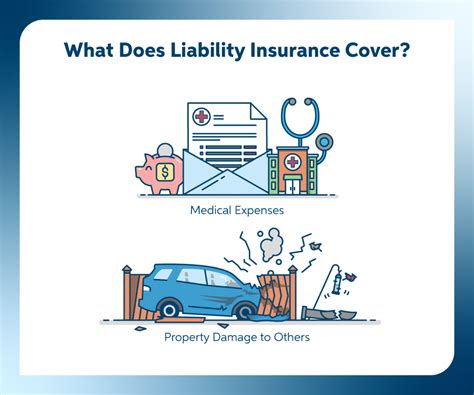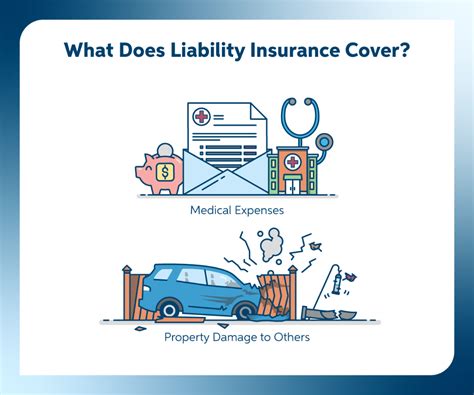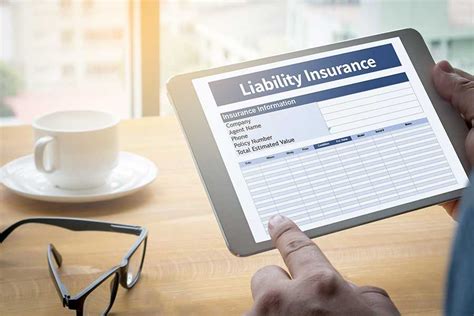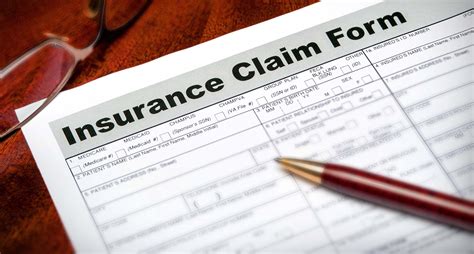Liability Insurance Cover

Liability insurance is an essential aspect of financial protection for individuals and businesses alike. In a world filled with potential risks and unforeseen circumstances, having adequate liability coverage can provide peace of mind and safeguard against the financial consequences of unexpected events. This comprehensive guide aims to delve into the intricacies of liability insurance, exploring its various facets, benefits, and considerations to help readers make informed decisions about their coverage needs.
Understanding Liability Insurance

Liability insurance, often referred to as third-party insurance, is a specialized type of coverage designed to protect individuals and entities from financial liability arising from claims or lawsuits. It acts as a safety net, ensuring that policyholders are not solely responsible for paying damages or legal costs if they are found liable for causing harm or injury to others.
This form of insurance is particularly crucial in today's litigious society, where disputes and claims can arise from a multitude of situations. From slip-and-fall accidents on private property to professional errors and omissions, liability insurance provides a vital layer of protection against the potential financial devastation that can result from these incidents.
Types of Liability Insurance

Liability insurance comes in various forms, each tailored to address specific risks and circumstances. Here are some common types of liability coverage:
General Liability Insurance
General liability insurance is the most prevalent form of liability coverage. It offers broad protection for businesses and individuals against a range of common risks. This includes bodily injury, property damage, personal and advertising injury, and medical payments. General liability insurance is particularly beneficial for businesses that interact with the public, as it can cover claims arising from customer injuries, product defects, or advertising disputes.
Professional Liability Insurance
Also known as errors and omissions (E&O) insurance, professional liability insurance is designed for professionals such as doctors, lawyers, consultants, and financial advisors. It provides coverage for claims arising from professional mistakes, negligence, or omissions that result in financial loss for a client. This type of insurance is crucial for professionals who provide advice or services that could potentially lead to legal disputes.
Product Liability Insurance
Product liability insurance is essential for businesses that manufacture, distribute, or sell tangible goods. It protects against claims of bodily injury or property damage caused by a product defect or malfunction. This coverage is particularly critical for businesses operating in highly regulated industries, such as pharmaceuticals or consumer electronics, where product safety is paramount.
Umbrella Liability Insurance
Umbrella liability insurance provides an additional layer of protection on top of existing liability policies. It kicks in when the limits of a primary liability policy are exhausted, offering higher limits of coverage for catastrophic claims or lawsuits. Umbrella policies are ideal for individuals or businesses with significant assets to protect, as they can provide millions of dollars in additional liability coverage.
Other Specialized Liability Coverages
Beyond the aforementioned types, there are numerous specialized liability insurance policies tailored to specific industries or risks. These may include cyber liability insurance for data breaches, directors and officers (D&O) liability insurance for corporate governance issues, or pollution liability insurance for environmental risks. Each specialized policy addresses unique concerns and provides tailored protection.
Key Benefits of Liability Insurance
Liability insurance offers a multitude of advantages that go beyond the mere financial protection it provides. Here are some key benefits of having adequate liability coverage:
- Peace of Mind: Knowing that you are protected against potential financial losses from lawsuits or claims can provide immense peace of mind. Liability insurance helps individuals and businesses focus on their core activities without constant worry about unforeseen liabilities.
- Risk Management: Liability insurance serves as a vital component of a comprehensive risk management strategy. It helps mitigate the financial risks associated with operating a business or engaging in various activities, allowing entities to better manage their overall exposure.
- Legal Defense Costs: In the event of a lawsuit, liability insurance often covers the costs associated with legal defense, including attorney fees and court costs. This can be a significant financial relief, as legal proceedings can be expensive and time-consuming.
- Protection of Assets: One of the primary benefits of liability insurance is its ability to safeguard personal and business assets. By providing coverage for potential liabilities, insurance policies help prevent the depletion of assets through settlements or judgments, thus preserving financial stability.
- Credibility and Reputation: For businesses, having adequate liability insurance can enhance credibility and reputation. It demonstrates a commitment to responsible business practices and can be a deciding factor for clients, partners, or investors who prioritize working with entities that have robust risk management measures in place.
Considerations and Limitations
While liability insurance is a valuable tool for risk management, it is important to understand its limitations and make informed decisions about coverage.
Policy Exclusions
Every liability insurance policy contains exclusions, which are specific circumstances or claims that are not covered by the policy. It is crucial to carefully review the policy document to understand these exclusions. Common exclusions may include intentional acts, contractual liabilities, and certain types of professional negligence.
Policy Limits
Liability insurance policies have specified limits of coverage, which represent the maximum amount the insurer will pay for a covered claim. It is essential to select policy limits that align with your risk tolerance and potential liabilities. Higher limits provide greater protection but may result in higher premiums.
Deductibles and Retentions
Liability insurance policies often include deductibles or retentions, which are amounts that the policyholder must pay out of pocket before the insurance coverage kicks in. Deductibles and retentions can vary based on the type of policy and the level of coverage selected. Understanding these costs is crucial when evaluating the overall cost-effectiveness of a liability insurance plan.
Additional Insureds
In certain situations, such as when renting property or working with contractors, you may need to add additional insureds to your liability policy. This extends coverage to individuals or entities who are not primary policyholders but are involved in your activities. It is important to discuss this option with your insurer to ensure proper protection.
Claims Handling and Reputation
The claims handling process and the insurer’s reputation are critical factors to consider when choosing a liability insurance provider. A reputable insurer with a proven track record of handling claims efficiently and fairly can provide added peace of mind. Researching customer reviews and industry ratings can help assess an insurer’s claims handling capabilities.
Performance Analysis and Real-World Examples

Liability insurance has proven its worth in numerous real-world scenarios. Take, for example, the case of a small business owner who was sued for a slip-and-fall accident that occurred on their premises. With general liability insurance in place, the policy covered the legal costs and provided a financial settlement to the injured party, preventing the business owner from facing personal financial ruin.
In another instance, a consulting firm faced a lawsuit from a client who alleged that the firm's advice led to significant financial losses. The firm's professional liability insurance policy covered the legal defense costs and provided a settlement to the client, allowing the firm to maintain its reputation and continue operating without major disruptions.
These examples highlight the critical role that liability insurance plays in protecting individuals and businesses from the financial impact of unexpected liabilities. By providing coverage for legal costs, settlements, and judgments, liability insurance allows policyholders to focus on their core activities and mitigate the potential damage to their financial well-being.
Future Implications and Trends
As the landscape of liability risks continues to evolve, liability insurance will play an increasingly crucial role in protecting individuals and businesses. With emerging technologies, such as autonomous vehicles and artificial intelligence, new liability concerns are arising. Insurers are adapting their policies to address these evolving risks, offering specialized coverage for technology-related liabilities.
Additionally, the increasing awareness of environmental issues has led to a growing demand for pollution liability insurance. As businesses face greater scrutiny for their environmental impact, liability insurance providers are developing policies that cover pollution-related claims, helping businesses manage their environmental risks effectively.
Furthermore, the rise of remote work and digital interactions has brought about new liability concerns related to data privacy and cybersecurity. Insurers are responding by offering comprehensive cyber liability insurance policies that address these emerging risks, providing businesses with the necessary protection in the digital age.
As the world becomes increasingly interconnected and complex, liability insurance will continue to evolve to meet the changing needs of individuals and businesses. Staying informed about the latest trends and developments in liability coverage will be essential for making informed decisions about risk management and financial protection.
Expert Insights and Recommendations
When it comes to liability insurance, seeking expert advice is invaluable. Insurance professionals can provide tailored recommendations based on your specific needs and circumstances. They can help you navigate the complex world of liability coverage, ensuring that you have the right policies in place to protect your assets and provide the necessary peace of mind.
FAQ
How much does liability insurance cost?
+The cost of liability insurance varies based on several factors, including the type of coverage, policy limits, and the level of risk associated with your activities. General liability insurance for a small business, for instance, may range from a few hundred to a few thousand dollars annually. However, specialized policies like professional liability insurance can be more expensive, with premiums varying depending on the profession and potential liabilities.
What are the consequences of not having liability insurance?
+Failing to have adequate liability insurance can have severe consequences. If you are found liable for causing harm or injury to others and do not have insurance coverage, you may be personally responsible for paying the full amount of damages or legal costs. This can lead to financial hardship, depletion of assets, and even bankruptcy. It is essential to have the right liability coverage to protect your financial well-being.
Can liability insurance cover intentional acts?
+In general, liability insurance policies exclude coverage for intentional acts. This means that if you intentionally cause harm or injury to others, your liability insurance will likely not provide coverage. However, there may be exceptions depending on the specific policy and circumstances. It is crucial to review your policy carefully to understand the coverage exclusions related to intentional acts.
How often should I review my liability insurance coverage?
+Regularly reviewing your liability insurance coverage is essential to ensure it remains adequate and aligned with your changing needs and circumstances. It is recommended to review your policies annually or whenever significant changes occur, such as expanding your business, adding new services, or facing new liability risks. Staying proactive in assessing your coverage needs can help prevent gaps in protection.



